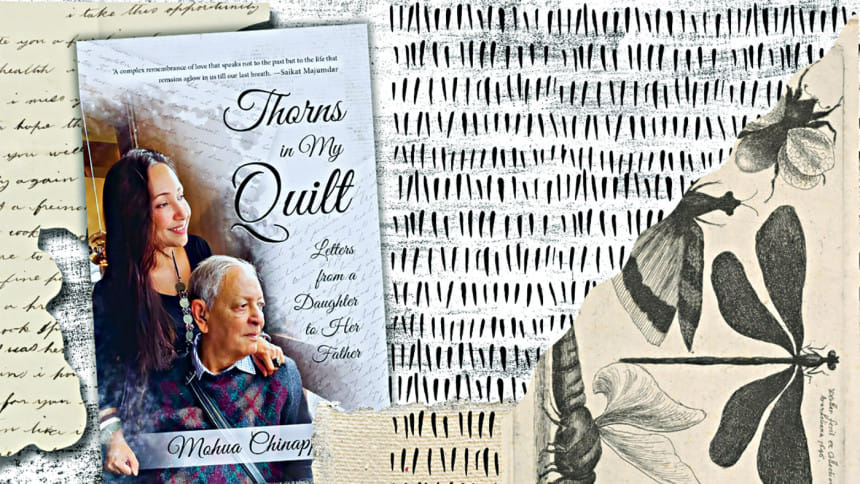Letters across the silence

In Thorns in My Quilt, Mohua Chinappa offers readers a searingly honest and emotionally resonant series of letters addressed to her late father. But before these letters unfold, we are led into a history that anchors the personal in the political—a story of displacement, privilege, and loss that stretches from Dhaka to Shillong.
Mohua's father, one among 11 siblings, was raised in an educated East Bengal family. Her grandfather, Jamini Kumar Bhattacharjee, was a gold medallist from Dhaka, a principled man whose values were rooted in knowledge and integrity. Her grandmother, Thamma, came from an established household in Cumilla. The vivid image of her childhood home, complete with a temple, a large pond teeming with fish, and a bustling atmosphere of care, evokes the pre-Partition Bengali world that many in Bangladesh will recognise intimately.
But like countless Bengali families uprooted by Partition, theirs too became a life of fragments. The ancestral home was left behind, and the family rebuilt itself in Shillong, carrying with them the echoes of a lost homeland and the weight of survival in a new one. This layered legacy of privilege turned precarity, of memory strained by migration, forms a quiet yet persistent undercurrent through the book.
Against this backdrop, the letters from daughter to father feel even more poignant. Mohua writes not only to grieve her Baba, but to confront the complexity of their relationship. He was, she says, "as kind as he was cruel, as well-read as he was unworldly." In this paradox lies the core of the memoir, an aching tenderness entwined with unresolved pain.
The book resonates on multiple levels. It is a daughter's reckoning, but also a shared memory of displacement. The grandeur of the Cumilla household and the intellectual legacy of Dhaka are not just Mohua's inheritance. They belong to a collective Bengali past fractured by borders. Her family's migration to Shillong mirrors the stories of many East Bengalis who were forced to start anew, carrying only memories of what was left behind.
The cover, too, speaks volumes. A photograph of Mohua standing behind her aged father, both staring off into the distance, captures the emotional tenor of the book perfectly. There is space, both physical and emotional, between them. Yet there is also presence, loyalty, and longing. It is a powerful image of connection and distance, of a bond shaped by time, silence, and everything in between.
Her prose is direct and intimate, capturing not only the love and disappointment she felt, but also the solitude of dealing with his death. Childhood memories, like the scent of vanilla in the butter cookies he baked, or the image of her small hand in his as they walked the rainswept roads of Shillong, are recalled with sensory richness and emotional clarity. These memories are neither idealised nor embittered. They are held gently, examined with care.
What sets Thorns in My Quilt apart is its courage in acknowledging that love does not erase hurt. Mohua's letters are at times raw and selfish, but never dishonest. They reveal a woman grieving not just her father, but the version of herself she lost in a failed marriage, in abandonment, and in trying to measure up to an impossible ideal. In these confessions, there is a quiet resilience, a refusal to look away from emotional truth.
The book resonates on multiple levels. It is a daughter's reckoning, but also a shared memory of displacement. The grandeur of the Cumilla household and the intellectual legacy of Dhaka are not just Mohua's inheritance. They belong to a collective Bengali past fractured by borders. Her family's migration to Shillong mirrors the stories of many East Bengalis who were forced to start anew, carrying only memories of what was left behind.
Despite all this, Thorns in My Quilt does not dwell in nostalgia. Instead, it becomes an act of reclamation. By writing these letters, Mohua not only confronts the silence between her and her father but also stitches together the fragments of a life shaped by exile, love, and endurance.
This is a memoir of grief, but more importantly, it is a portrait of a woman finding voice in loss. Mohua's emotional honesty, combined with her sharp eye for detail, makes this an unforgettable read. What truly elevates Thorns in My Quilt is her writing. It is measured, lucid, and deeply intimate. She writes not with the flourish of a performer but with the clarity of someone unburdening the heart. Her style is emotionally restrained yet piercing, allowing the reader to feel the unsaid as much as the spoken. Each letter reads like a quiet act of courage, stitched with vulnerability, sharp introspection, and a poetic sensitivity to both place and feeling.
Thorns in My Quilt is not just a memoir. It is an act of remembering, of reclaiming, and, finally, of release. It speaks quietly, but powerfully to all those who have loved and lost, and to those still carrying the ghosts of places once called home.
Namrata is a literary consultant, columnist, and podcast host.

 For all latest news, follow The Daily Star's Google News channel.
For all latest news, follow The Daily Star's Google News channel. 



Comments